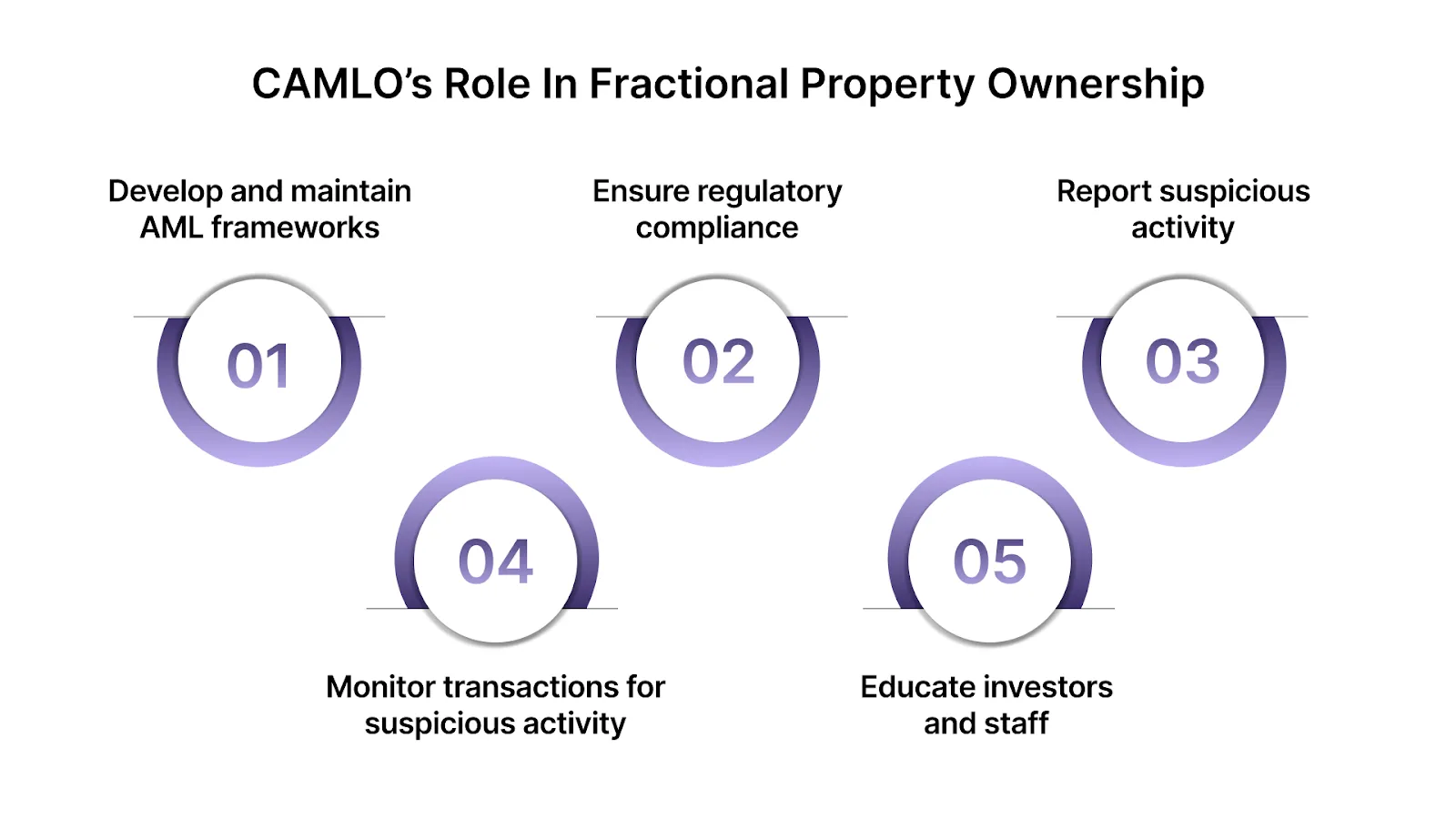Nov 12, 2025
Why You Need Chief Anti-Money Laundering Officer Services in 2026

By Fraxtional LLC

In today’s business world, staying compliant with regulations is a growing challenge. As companies expand, the risk of regulatory violations increases, often leading to fines and loss of trust. The pressure to maintain compliance is constant and can be overwhelming, especially when laws change frequently.
A 2024 report from the U.S. SEC highlighted over $8.2 billion in penalties due to non-compliance. This shows how critical it is for businesses to manage financial crime and compliance risks effectively. But how can you do this without draining your resources?
In this blog, we’ll explore the role of a Chief Anti-Money Laundering Officer (CAMLO), why companies need expert leadership in managing financial crime risks, and how fractional CAMLO services can help.
Key Takeaways:
- CAMLO's Key Responsibility: Ensures compliance with anti-money laundering regulations in property transactions.
- Cost-effective Oversight: Fractional CAMLO services provide expert compliance without full-time commitment.
- Global Expertise: Fractional CAMLOs are equipped to handle compliance across various international regulations.
- Flexible Support: CAMLO services scale with your business, adapting to changing needs.
- Risk Management: Fractional CAMLOs help reduce legal and financial risks from non-compliance.
Understanding the CAMLO’s Role in Fractional Property Ownership
In fractional property ownership, ensuring compliance with anti-money laundering (AML) regulations is essential. A CAMLO plays a crucial role in managing the associated risks. Their responsibilities are designed to protect investors and ensure regulatory adherence throughout property transactions.

Here’s a breakdown of the CAMLO’s responsibilities in the context of fractional property ownership:
- Develop and maintain AML frameworks: Establish comprehensive strategies to identify, assess, and manage money laundering risks across property investments.
- Monitor transactions for suspicious activity: Ensure that all financial transactions in property deals are closely tracked for any signs of illicit activity.
- Ensure regulatory compliance: Stay updated on global AML regulations and ensure that all property transactions comply with local and international laws.
- Educate investors and staff: Conduct training to raise awareness about money laundering risks and ensure internal controls are followed.
- Report suspicious activity: File Suspicious Activity Reports (SARs) with relevant authorities when potential money laundering activity is detected in transactions.
By effectively managing these responsibilities, a CAMLO helps safeguard fractional property ownership investments from financial crime risks and ensures compliance with relevant regulations.
Also Read: How CAML Officer Services Help Your Business Stay Compliant?
Why AML Compliance is Critical in Fractional Property Ownership

AML compliance is especially crucial in fractional property ownership due to the large financial transactions involved. Investors and stakeholders need confidence that their investments are secure and compliant with regulations. Without proper oversight, companies face legal and financial risks that could damage their reputation and business operations.
Here’s why AML compliance is essential in fractional property ownership:
- Preventing money laundering: Fractional property ownership involves large sums of money, making it a prime target for money laundering. AML compliance helps mitigate this risk.
- Meeting legal obligations: Governments and regulators impose strict AML laws on real estate transactions. Non-compliance can result in penalties, fines, and loss of credibility.
- Protecting investors: AML practices protect investors from unknowingly being involved in illegal activities, ensuring that funds are clean and legitimate.
- Safeguarding company reputation: Non-compliance with AML regulations can severely damage a company's reputation, making it less attractive to future investors.
- Ensuring regulatory adherence: Regular AML checks ensure that fractional property businesses stay compliant with both local and international regulations, avoiding unnecessary legal challenges.
By prioritizing AML compliance, fractional property ownership companies can create a secure environment for investors while meeting the growing regulatory demands.
Also Read: How to Conduct a Compliance Risk Assessment
Why Fractional CAMLO Services are Beneficial?

For many businesses, especially those in fractional property ownership, hiring a full-time CAMLO may not be feasible. However, the risks associated with non-compliance can have serious financial and legal consequences.
Fractional CAMLO services provide a flexible and cost-effective solution to ensure proper oversight and compliance, eliminating the need for a permanent hire.
Here’s why fractional CAMLO services are so beneficial:
- Cost-effective compliance: Fractional CAMLOs provide expert compliance leadership on a part-time basis, reducing the financial burden of a full-time hire.
- Scalability: As your business grows, fractional CAMLO services can scale with your needs, providing more or less support depending on your current requirements.
- Access to expertise: Fractional CAMLOs bring a high level of experience and specialized knowledge, ensuring your compliance strategies are effective and up-to-date with regulations.
- Global compliance: Fractional CAMLO services offer expertise in various jurisdictions, ensuring your business meets local and international regulatory requirements.
- Immediate support: Fractional CAMLOs can quickly step in to address compliance challenges or gaps, ensuring your business stays on track and meets deadlines.
A fractional CAMLO offers the expertise and flexibility needed to address compliance challenges as your business grows or faces new regulatory requirements.
Also Read: Role and Value of an Interim MLRO in Financial Firms
CAMLO AML Responsibilities Across Major Markets

AML regulations differ from one country to another, making compliance a complex challenge for businesses operating in multiple regions. A Chief Anti-Money Laundering Officer (CAMLO) must be familiar with these variations to ensure the business meets legal standards.
Here are the key AML responsibilities of a CAMLO across major markets:
- U.S.: Ensure compliance with the Bank Secrecy Act (BSA) and FinCEN regulations. Oversee Suspicious Activity Reports (SARs) and adhere to FATF guidelines to combat money laundering.
- U.K.: Oversee compliance with the Proceeds of Crime Act (POCA), Money Laundering Regulations (MLR), and monitor compliance with the Financial Conduct Authority (FCA).
- European Union: Implement the EU’s Anti-Money Laundering Directives (AMLD), focusing on customer due diligence (CDD), reporting suspicious activity, and ensuring compliance with regional regulations.
- Asia-Pacific: Adhere to various national AML frameworks, like Australia’s AUSTRAC and Singapore’s MAS regulations, focusing on cross-border money laundering risks and financial crime prevention.
- Middle East: Ensure compliance with FATF recommendations and regional AML laws, such as those implemented by the UAE's Financial Intelligence Unit (FIU), which focus on real estate and large transactions.
A CAMLO must adjust AML strategies to the specific requirements of each market while maintaining a unified approach to compliance across regions.
Also Read: Fintech Compliance: Essential Practices and Challenges
When is it Time to Engage a Fractional CAMLO?

Deciding when to bring in a fractional CAMLO depends on your company’s compliance needs, growth stage, and regulatory pressures. Many businesses, particularly in real estate, face challenges in managing compliance with limited resources.
Fractional CAMLO services offer the flexibility to gain expert guidance when needed, without the expense of a full-time hire.
Here are some signs it’s time to engage a fractional CAMLO:
- Expansion into new markets: If your business is entering multiple regions with different AML requirements, a fractional CAMLO can help navigate the complexities.
- Rapid business growth: As your company scales, managing compliance across various functions can become challenging. A fractional CAMLO ensures you stay compliant while growing.
- Compliance gaps or inefficiencies: When your internal compliance processes become strained, a fractional CAMLO can step in to fill gaps and ensure regulatory adherence.
- Preparation for audits or investor scrutiny: If you’re preparing for an audit or funding round, a fractional CAMLO ensures your business meets all necessary AML standards.
- Limited internal resources: If you lack the capacity to hire a full-time CAMLO but need expert oversight, a fractional CAMLO provides a cost-effective solution.
A fractional CAMLO offers the expertise and flexibility needed to address compliance challenges as your business grows or faces new regulatory requirements.
Also Read: When to Hire a Fractional Compliance Officer
Conclusion
Ensuring compliance in fractional property ownership is essential, especially as regulations become more complex. With customized solutions, a fractional CAMLO helps you stay compliant and protect your business from financial crime risks.
If you are ready to take the next step in protecting your business from financial crime risks, Fraxtional offers flexible, on-demand fractional CAMLO services. Our team brings extensive expertise in regulatory compliance, ensuring that your business remains compliant across all markets.
Contact us today to schedule a demo and discover how our fractional CAMLO services can help your business stay compliant and secure while enabling growth.
FAQs
AI can assist with detecting suspicious activities and automating tasks, but human oversight and judgment are still essential for effective anti-money laundering (AML) practices.
A money laundering officer is typically responsible for ensuring a company adheres to AML regulations, monitors financial transactions, and reports suspicious activities. This role can be fulfilled by a CAMLO (Chief Anti-Money Laundering Officer) in some organisations.
The responsibility for anti-money laundering typically falls on the compliance team within an organisation, with the CAMLO or MLRO (Money Laundering Reporting Officer) overseeing the implementation and enforcement of AML policies.
Yes, the FBI investigates and enforces U.S. laws related to money laundering, particularly in cases involving financial institutions or criminal organisations.
Both roles focus on preventing money laundering, but a CAMLO typically has broader responsibilities, overseeing global AML strategies across different business functions, while an MLRO is more focused on day-to-day compliance and reporting within an organisation.
blogs
Don’t miss these
Let’s Get Started
Ready to Strengthen Your Compliance Program?
Take the next step towards expert compliance solutions. Connect with us today.




